|
||
      |
Peer Review ::
Where are they now?
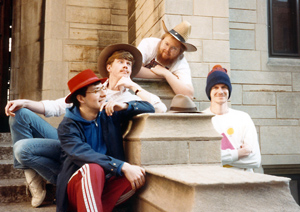 In
1989, while noshing on nachos at the Burton-Judson Pit Stop snack bar, Doug
Anderson, AB’89, JD’92, Ernie Barreto, AB’90, Jon Trowbridge,
AB’91, SM’92, and Bert Vaux, AB’90, debated the “onomastic
randomness” of band names. The conversation led to the Redundant Steaks:
Ribeye (Doug), Cubesteak (Ernie) Buttersteak (Jon), and Buttsteak (Bert).
“Bert had a four-track cassette recorder, guitars, and a Casio keyboard.
Ernie played bass and had a flute. Doug had a Radio Shack microphone. Jon
had inflatable dinosaurs. The rest is musical history,” boasts the
group’s Web site. Fellow alumni might best remember the cameo guitar
stylings of Bobo the Clown and “the frenzied clash of inflatable titans
during live performances of Petrified Vomit.” The Steaks’ final
gig took place at the C-Shop during the 1990 Festival of the Arts.
In
1989, while noshing on nachos at the Burton-Judson Pit Stop snack bar, Doug
Anderson, AB’89, JD’92, Ernie Barreto, AB’90, Jon Trowbridge,
AB’91, SM’92, and Bert Vaux, AB’90, debated the “onomastic
randomness” of band names. The conversation led to the Redundant Steaks:
Ribeye (Doug), Cubesteak (Ernie) Buttersteak (Jon), and Buttsteak (Bert).
“Bert had a four-track cassette recorder, guitars, and a Casio keyboard.
Ernie played bass and had a flute. Doug had a Radio Shack microphone. Jon
had inflatable dinosaurs. The rest is musical history,” boasts the
group’s Web site. Fellow alumni might best remember the cameo guitar
stylings of Bobo the Clown and “the frenzied clash of inflatable titans
during live performances of Petrified Vomit.” The Steaks’ final
gig took place at the C-Shop during the 1990 Festival of the Arts.
Today, as Anderson wrote in an e-mail, “The Redundant Steaks remains one of the most accomplished bands in the world. Just not musically.”
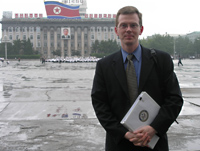 Got
a campus group you keep in touch with? E-mail uchicago-magazine@uchicago.edu
and tell us where you are now.
Got
a campus group you keep in touch with? E-mail uchicago-magazine@uchicago.edu
and tell us where you are now.
Ribeye:
Singer Anderson is legal counsel to the House of Representatives Committee
on International Relations and its Subcommittee on Asia and the Pacific,
where he works on Asia regional issues for Rep. Henry J. Hyde (R-IL) and
subcomittee chair James A. Leach (R-IA). Anderson was the key legislative
strategist behind the North Korean Human Rights Act. Earlier he spent five
years as counsel to the House Subcommittee on International Operations and
Human Rights.
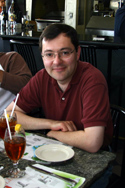 He
worked as a litigator in Phoenix before “contriving his (so far) successful
escape from private legal practice.” Anderson and wife Rebecca live
in Alexandria, VA, with their four children. He continues to compose and
record at home in his (limited) spare time.
He
worked as a litigator in Phoenix before “contriving his (so far) successful
escape from private legal practice.” Anderson and wife Rebecca live
in Alexandria, VA, with their four children. He continues to compose and
record at home in his (limited) spare time.
Cubesteak:
Bass, flute, and mouth-harp player Barreto moved to the University of Maryland
at College Park, where he studied chaos theory and nonlinear dynamics. He
also toured Europe with the University of Maryland Chorus and participated
in several international Handel festivals. Barreto focuses on theoretical
neuroscience as an associate professor of physics at George Mason University
in Fairfax, VA, and sings with the Grammy Award–winning Washington
Chorus.
He also whistles while he works, winning third place at the International Whistlers Convention in 2002 and 2003, and appearing in the 2005 documentary Pucker Up: The Fine Art of Whistling. Last January he and wife Terri welcomed son Simon.
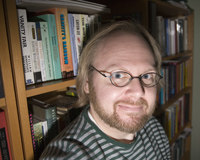 Buttersteak:
Buttersteak:
Lyricist Jon Trowbridge studied mathematics at the U of C as an undergraduate
and a graduate student. Dropping out of the PhD program (“the smartest
thing I ever did”), he spent six years crunching numbers for futures
traders before joining a friend’s Linux-oriented start-up. After five
years split between the scrappy start-up and the corporation that acquired
it, he now works at Google as a software engineer.
Trowbridge is the cocreator (along with U of C graduate student Eric Elshtain) of Gnoetry, a computer poetry-generation system inspired by the constrained writing techniques of the French Oulipo school. Check it out at www.beardofbees.com. He lives in Chicago’s Ukrainian Village.
Buttsteak:
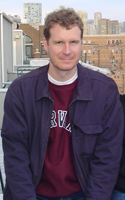 Guitarist
Vaux starts as a professor of linguistics at the University of Cambridge,
England, this July after 13 years at Harvard and three at Wisconsin. His
research focuses on endangered languages of the Caucasus, especially Armenian
and Abkhaz, although he also works on English dialects.
Guitarist
Vaux starts as a professor of linguistics at the University of Cambridge,
England, this July after 13 years at Harvard and three at Wisconsin. His
research focuses on endangered languages of the Caucasus, especially Armenian
and Abkhaz, although he also works on English dialects.
His 2003 Harvard Survey of North American Dialects collected data on more than 120 dialect traits from 50,000 speakers of American English, and was featured in the New York Times, USA Today, and Science. Vaux also discovered a 16th-century manuscript in Oxford’s Oriental Library—the only known example of the now-dead Ankara dialect of Armenian was billed in the library’s catalog as “corrupt Armenian.”